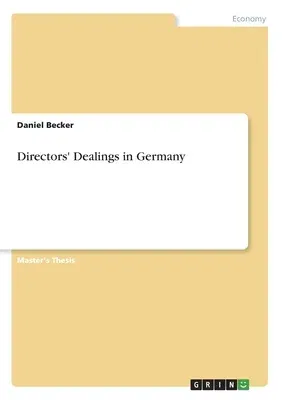Master's Thesis from the year 2016 in the subject Business economics -
Banking, Stock Exchanges, Insurance, Accounting, grade: 12,0,
Justus-Liebig-University Giessen, language: English, abstract: According
to Stützel (1960), insider transactions are comparable with roulette,
where corporate insiders - in contrast with regular players - have the
privilege to place their chips after the ball begins to rest. In other
words, certainly, the outcome of the game is well known to corporate
insiders. Apart from that, focusing on capital market transactions, are
corporate insiders turned out to be winners? Due to their closeness to
the business, it is said that corporate insiders possess firm-specific,
non-public, and value-relevant information. Various international
empirical findings support that they are able to exploit their
information advantage towards market participants, so-called outsiders.
Additionally, corporate insiders represent anti-cyclical abilities and
they are also capable to realize price discrepancies deviating from the
firm's intrinsic value. Is there an opportunity for market participants
to benefit as well? Because of legal leeway and a lag in technical
transmission, typically, outsiders are informed later about transactions
in own company stocks by insiders. However, referring to existing
literature, predominantly, they also benefit by imitating transactions
after public announcement as long as transaction costs are ignored.
Thus, capital market efficiency is violated. Of course, this link is
recognized. For instance, in 2006, in cooperation with the FIFAM
Research Institute for Asset Management, Handelsblatt, and the Technical
University of Aachen, the Commerzbank published an insider trend
barometer displaying the ratio from purchases to sales every two weeks
(Handelsblatt, 2016). Furthermore, the Commerzbank issued a certificate
containing companies of the DAX30 associated with directors' dealings
(Commerzbank, 2006). In comparison with establi


